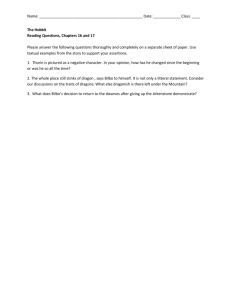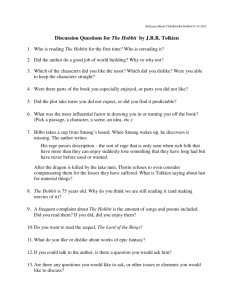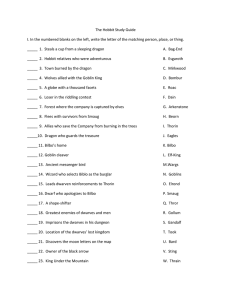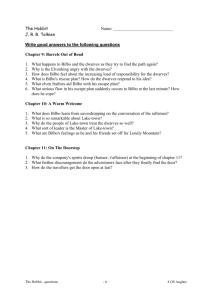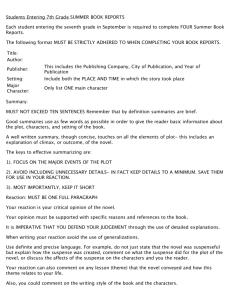The Hobbit CHAPTER 14 Questions and Answers
advertisement
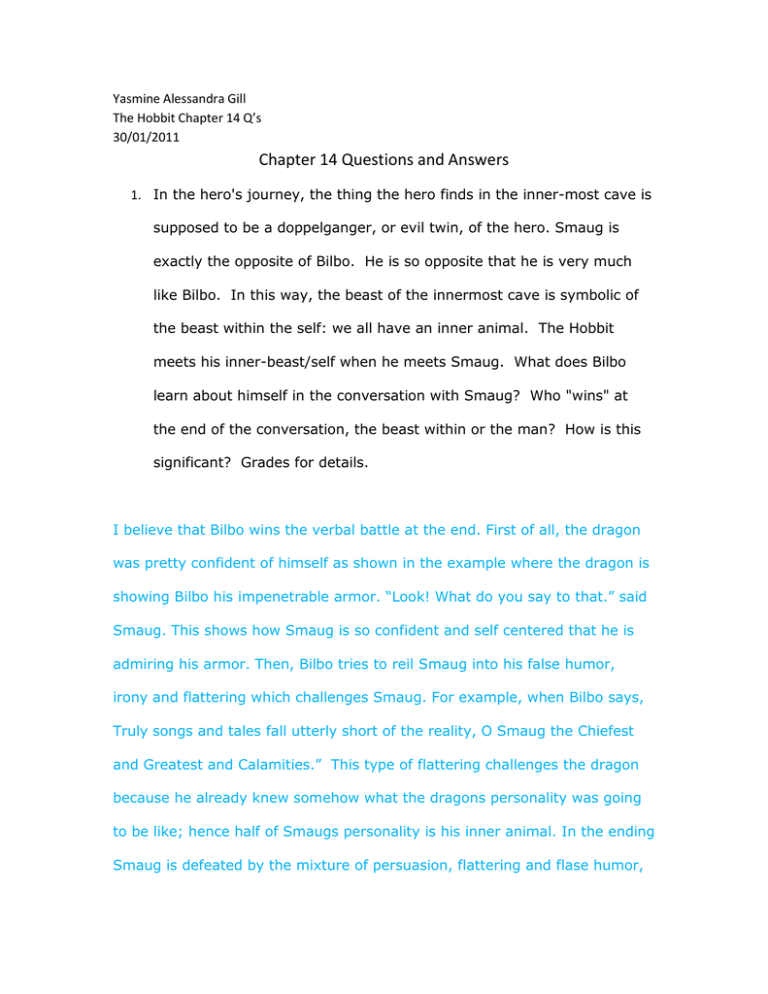
Yasmine Alessandra Gill The Hobbit Chapter 14 Q’s 30/01/2011 Chapter 14 Questions and Answers 1. In the hero's journey, the thing the hero finds in the inner-most cave is supposed to be a doppelganger, or evil twin, of the hero. Smaug is exactly the opposite of Bilbo. He is so opposite that he is very much like Bilbo. In this way, the beast of the innermost cave is symbolic of the beast within the self: we all have an inner animal. The Hobbit meets his inner-beast/self when he meets Smaug. What does Bilbo learn about himself in the conversation with Smaug? Who "wins" at the end of the conversation, the beast within or the man? How is this significant? Grades for details. I believe that Bilbo wins the verbal battle at the end. First of all, the dragon was pretty confident of himself as shown in the example where the dragon is showing Bilbo his impenetrable armor. “Look! What do you say to that.” said Smaug. This shows how Smaug is so confident and self centered that he is admiring his armor. Then, Bilbo tries to reil Smaug into his false humor, irony and flattering which challenges Smaug. For example, when Bilbo says, Truly songs and tales fall utterly short of the reality, O Smaug the Chiefest and Greatest and Calamities.” This type of flattering challenges the dragon because he already knew somehow what the dragons personality was going to be like; hence half of Smaugs personality is his inner animal. In the ending Smaug is defeated by the mixture of persuasion, flattering and flase humor, which Bilbo, to conclude, flattered him and insulted him in one sentence. “Well, I really must not detain Your Magnificence any longer,” he said (flattery) “or keep you from much needed rest. Ponies take some catching, I believe, after a long start. And so do burglars.” At the ending (as shown in the sentence) Bilbo figuratively slapped him across the face with an insult and a comparison between him and Smaug which means that he has defeated his inner animal and is ready to storm off with confidence. 2. What is special about the arrow that Bard uses to shoot the dragon. Grades for details. The black arrow that Bard uses to shoot the dragon was very special because the dialogue mentions that that arrow has never failed him before and that it was from his past fathers. “Arrow!” said the bowman. “Black Arrow! Have saved you to last! You have never failed me and always I have recovered you. I have you from my father and he from of old. If ever you came from the forges of the true king under the Mountain, go now and speed well!” This quote mentions why he chose this arrow and how it will help him kill Smaug. 3. What tactics does the Master use to prevent people from hating him after the death of the dragon? Give more than one tactic. Give lots of details. The Master tried many ways to make the people change their mind about the way they think about him after the death of the dragon. One of the tactics is persuasion. “Who played on our soft hearts and our pleasant fancies? What sort of gold have they sent down the river to reward us?” says The Master. He is convincing the people that they are wrong and all that he has done for them. He also uses flattery for “winning” them back. “He has tonight earned an eminent place in the roll of the benefactor of our town; and he is worthy of many imperishable songs. But, why O People?” The part where the Master says “ O People shows he’s trying flatter them by compliments that are a bit over board. Lastly, The Master used many apologies and questions of disbelief. “Why do I get all your blame? For what fault am I to be deposed?” These quotes show The Master trying to persuade the people to change their mind by questioning their opinion of him.
